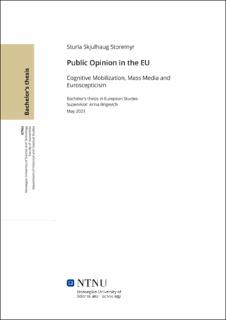| dc.contributor.advisor | Brigevich, Anna | |
| dc.contributor.author | Storemyr, Sturla Skjulhaug | |
| dc.date.accessioned | 2023-09-23T17:21:29Z | |
| dc.date.available | 2023-09-23T17:21:29Z | |
| dc.date.issued | 2023 | |
| dc.identifier | no.ntnu:inspera:145530834:68646932 | |
| dc.identifier.uri | https://hdl.handle.net/11250/3091572 | |
| dc.description.abstract | Euroskeptisisme er et begrep som har blitt hyppigere tatt i bruk de siste årene, spesielt etter Brexit. Det har blitt gjort mange forsøk på finne årsakene til økt Euroskeptisisme. Ett av disse forsøkene ble gjort av Ronald Inglehart i sin artikkel om Kognitiv Mobilisering og Europeisk identitet. Ved å kombinere hans teori med RAS-modellen laget av John R. Zaller utforsker denne teksten rollen media og kognitiv mobilisering har i utformingen av politiske meninger i en befolkning. Ved hjelp av en statistisk analyse blir påvirkningen disse variablene har på euroskeptisisme målt. Resultatene viser at et større konsum av media øker euroskeptisisme, mens en lengre utdanning fører til mer positivitet ovenfor EU. Allikevel er disse resultatene svake i forhold til kontrollvariablene som forteller at det politiske ståstedet til nasjonale statsapparater har mye større innvirkning på folkeopinionen om EU enn variablene som i hovedsak ble testet. | |
| dc.description.abstract | Euroscepticism is a term that has become frequently more used, especially after Brexit. There have been many attempts of exploring the mechanisms behind Euroscepticism amongst the public. One such attempt was made by Ronald Inglehart in his article about Cognitive Mobilization and European Identity. By combining this theory with the RAS-model made by John R. Zaller this paper explores the role of the media and cognitive mobilization in the development of political opinions amongst the public. Through a statistical analysis the impact these variables have on Euroscepticism is tested. The results show that more media consumption makes the public more Eurosceptic, whilst longer education tends to make them more pro-EU. These results, however, are weak compared to the control variables which tells us that the political standpoint of national state-apparatuses has a much higher impact on the public opinion regarding the EU than the two theories in question. | |
| dc.language | eng | |
| dc.publisher | NTNU | |
| dc.title | Public Opinion in the EU: Cognitive Mobilization, Mass Media and Euroscepticism | |
| dc.type | Bachelor thesis | |
